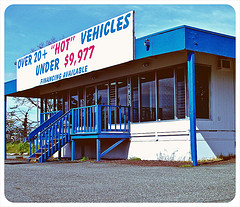5 Scams To Watch Out For When Buying A Car

(БРАТСТВО)
While the internet has provided new levels of transparency to savvy car shoppers, it has also given scammers a wider audience on which to ply their nefarious trade. So it helps to educate yourself on some of their more devious methods before you jump into the car-buying arena.
Over at CNBC, they have put together a round-up of scams that can leave the naive car purchaser high and dry — and still in need for a ride home.
Here are some highlights:
1. Sympathy Scam
“[A] thief posing as a seller supplies a sad story to a potential buyer about why he or she needs to sell the car quickly… The sob story explains why the car’s asking price is so much lower than its current market value, and puts pressure on the buyer to make a quick decision. Buyers who fall victim to this scheme can end up with a lemon, or with no car at all.”
2. Shipping Scam
“In the shipping scam, a thief posing as a seller requests a deposit on a vehicle and promises to ship the vehicle to the potential buyer for personal inspection within a set number of business days. Typically thieves will tell prospective buyers a third-party shipping company will be in contact with the buyer to ship the car after the deposit is sent via wire service. Scammers often use forged or copied websites to appear legitimate.”
3. Purchase Protection Plan Scam
“In this scheme, the con artist pushes a protection plan for the transaction on a fake website. The potential buyer is encouraged to send a deposit or the full amount of the vehicle. The protection plan states that if the potential buyer does not receive the vehicle, he or she will be reimbursed for the total amount of the transaction invoiced.”
4. Photo Scam
The photo scam happens when a vehicle is listed online, with the text giving a normal market rate of, say, $13,000, while the photo accompanying the ad shows a price written on it of $4,000. The thief tells the potential buyer the price of the vehicle is $4,000, saying it was reduced for some reason designed to elicit sympathy (e.g., a recent layoff or death in the family). The victim pays the reduced rate thinking it’s a bargain, but then never receives the vehicle.
“Cars.com uses automatic filters to screen the text of ads, looking for cars that are priced too far below market value. Rock bottom prices are “almost always” a scam, according to the website’s fraud squad, so these listings get booted out of the system. Filters may not pick up text in a photo, however, so Cars.com employs a team to review a high percentage of the “sell-it-yourself” ads. Still, some slip through, so be wary of prices that look too good to be true.”
5. Phone Scam
“[T]he thief provides a contact phone number for potential buyers to use to inquire about the vehicle for sale. With Cars.com, for example, a field for a phone number must be completed, so scammers might enter a fax line, or a number they’ve just made up. Then the potential buyer is forced to email, and the fraudulent seller will inform the buyer that they prefer to do business over email anyway, and the scam proceeds from there.”
Car Buyers Beware: Nine Notorious Scams [CNBC]
Want more consumer news? Visit our parent organization, Consumer Reports, for the latest on scams, recalls, and other consumer issues.

